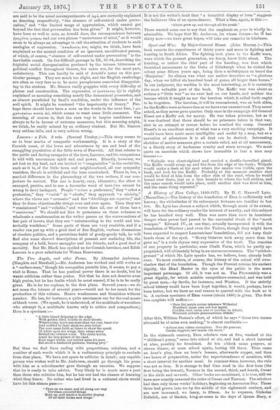The Two Angels, and other Poems. By Alexander Anderson. (Simpkin
and Marshall.)---Mr. Anderson has worked and still works as a "surface-man," though his occupation permits him, it seems, to pay a visit to Rome. That he has poetical power there is no doubt, but he wants criticism rather than praise. Not that he does not deserve even high praise, but he has faults which he must amend, if he is to be really great. He is far too copious, in the first place. Several years—we do not mean the leisure of several years—would not be too much for the production of this volume. Hence weaknesses and blemishes without number. He has, for instance, a quite uncommon ear for the real music of blank verse. (We speak, be it understood, of the multitude of versifiers who attempt it, a multitude known only to critics and compositors.) Here is a specimen :—
"A little island dripping to the edge
With golden lilies, double in their bloom; Where some, more amorous than the rest, leant o'er And nodded to their shadows seen below.
The coot came forth at times to show the speck Of white upon his wings, then swept away Behind the twisted roots. The silent heron, Amid the tiny pillars of the reed, Kept eager watch, nor stirred upon his post, But stood a feathered patience, waiting prey."
But then we find lines ending with prepositions, relatives, and a number of such words which it is a rudimentary principle to exclude from that place. We have not space to criticise in detail ; any capable person who wishes well to Mr. Anderson, should go through his poem with him as a schoolmaster goes through an exercise. We suppose that he is ready to take advice. Very likely he is much more a poet than those who criticise him, but he has not had the chance of learning what they know. No writer who had lived in a cultured circle would have lot this stanza pass :— " Thus on we went, and all along our way Cerulean-coloured things Bose up, and made a bountiful display Of all their forms and wings."
It is not the writer's fault that "a bountiful display of form" suggests the ludicrous idea of an opera-dancer. What a line, again, is this :—
"Alexis grew up, and through all his youth."
There wanted some one to say that the emphasis on grew is wholly in- admissible. We hope that Mr. Anderson, for whose future—he ii but thirty now—we have great hopes, will take our remarks in kindness.






































 Previous page
Previous page